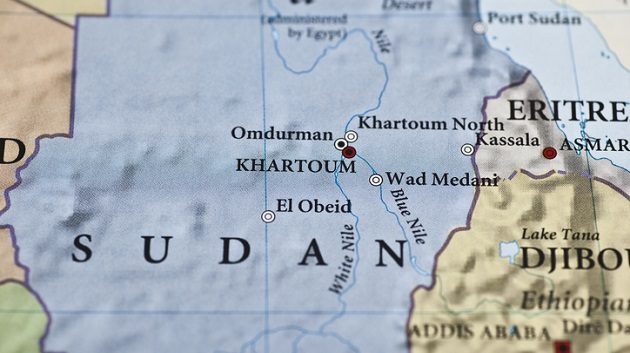
(WASHINGTON) — Humanitarians in Sudan, where a two-year civil war has given rise to the world’s most acute needs and made assistance increasingly difficult, warn that a vacuum left by cuts to U.S. funding for aid programs cannot be filled.
The civil war between the country’s army and a paramilitary group has displaced 11 million people internally and 4 million more are refugees in other countries. It’s the only place in the world where famine conditions have been confirmed in multiple locations, and the United Nations says 30 million Sudanese require assistance — or 60% of the country’s population.
The U.S. shuttered its arm for foreign assistance at the beginning of July, formerly the U.S. Agency for International Development, folding it under the State Department in a move Secretary of State Marco Rubio said marked the end of an “era of government-sanctioned inefficiency.” And the U.S. Senate could vote on legislation proposed by the Trump Administration as soon as this week to claw back over $8 billion in funding due to be dispersed for USAID in the remainder of the fiscal year.
“Moving forward, our assistance will be targeted and time limited,” Rubio wrote on Substack, adding the U.S. “will favor those nations that have demonstrated both the ability and willingness to help themselves and will target our resources to areas where they can have a multiplier effect.”
The months-long drawdown of USAID reduced its staff by 83% — down from 10,000 employees to a few hundred — and resulted in stop-work orders for grantees of its funds, including in Sudan. The State Department says the life-saving work of the agency, which distributes grants to aid implementers, is continuing, and said its new “America First” foreign assistance policy would be accountable to policymakers in Washington instead of global entities like the United Nations.
A senior State Department official last week called the end of USAID and the institution of a new overarching office at State “a milestone for American engagement in the world,” saying U.S. assistance abroad would be “linked up diplomatically” with U.S. interests.
The British medical journal Lancet found that in the absence of USAID’s funds and works, 14 million more people would die in the next five years, a third of those children under 5.
The senior State Department official downplayed the study.
“You can go back and relitigate all these little decisions. That’s not our focus. That’s not the secretary’s focus,” the official said. “We are excited about what sort of the America First foreign assistance agenda is going to look like, and how much impact we can have moving forward.”
Meanwhile, in the world’s most dire humanitarian crisis, where access for emergency food and medical workers has been made increasingly difficult by warring parties, people are fleeing violence on foot, children are malnourished, and Sudanese are dying from treatable conditions.
Pietro Curtaz, an emergency logistics coordinator for Médecins Sans Frontières (Doctors Without Borders, or MSF) said children he sees crossing Sudan’s border are malnourished at a rate of 29%.
The cuts to USAID — and the chaos that followed — have “come with a body count” in Sudan said Tom Perriello, the U.S. special envoy to Sudan in the last year of the Biden administration from 2024 to 2025.
There were 29 USAID employees in Sudan in 2023, at the outset of the war, according to then-administrator Samantha Powers.
The July 1 reprogramming of USAID into the State Department cut two additional U.S. staffers dedicated to Sudan, leaving just nine remaining in the region, said Andrea Tracy, a former USAID Sudan official who now runs her own humanitarian funding mechanism for the country.
Tracy saw colleagues lose their jobs on a daily basis as USAID wound down the programs it funded in the country, she told ABC News in a June phone call.
“I was talking to one of the regional directors the other day, and just that morning, she got an email saying another 40 programs are going to be cut,” she said. “So we haven’t found the floor yet.”
The dramatic reorientation of U.S. aid abroad comes as the United Kingdom, Switzerland, and Germany have announced a scaling down of their own foreign assistance budgets and as humanitarian crises in places like Sudan — where the civil war has stretched into a third year — deepen.
According to data from the U.N., USAID provided 44% of the world’s humanitarian funding in 2024 for Sudan.
A U.N. spokesman told ABC News that “food aid, nutrition support and essential health services” have been cut back as the U.N.’s annual fund for Sudan is funded at only 14%.
“Without urgent additional support, the risk of famine and further deterioration remains high,” said Dan Teng’o, a spokesperson for the U.N.’s Office for the Coordination of Humanitarian Affairs.
The State Department did not respond to requests by ABC News for the current data on its assistance commitments to Sudan after foreign aid freezes and layoffs.
But it said in a statement that “foreign assistance continues to arrive in Sudan,” citing a $56 million donation to the World Food Programme and a wheat grain delivery under USAID that would feed “as many as 3.2 million people for an entire month.”
It also said emergency assistance continues for refugees of Sudan who have been displaced to “seven neighboring countries due to the conflict.”
Important dollars for refugee assistance are in jeopardy, too, as humanitarians brace for the impacts of a proposed $1.7 billion cut to U.S. refugee assistance. As a part of Rubio’s reorganization, the State Department proposed a 50% reduction for aid to the world’s refugees in its 2026 budget request to Congress.
Chain reactions and health care at the brink
Humanitarians, who are legally protected under international law, have not been spared from the violence of the civil war, which has deprived people of the chance to stave off starvation and made access increasingly difficult.
Five humanitarians in June died when a U.N. convoy came under attack, the U.N. said.
In the void, small, grassroots organizations began to sprout when war broke out two years ago. A coalition known as Mutual Aid stood up emergency clinics and soup kitchens that became “a lifeline” for Sudanese, Tracy said. The coalition was backed by nearly 80% funding from USAID, organizers have said.
When the White House on President Donald Trump’s first day in office froze all U.S. assistance abroad, Tracy said, some 1,500 of the kitchens in Sudan closed almost immediately.
Perriello, whose role as the special envoy in Sudan has been left vacant by the Trump administration, said the Mutual Aid coalition was among a group of “edgy efforts … redefining approaches to aid.” These programs suffered the first and “deepest” cuts, he said.
Tracy said the pain from the cuts has been felt most acutely in the health sector, where medicine is not moving the way it used to and a “chain” of “different components that rely on each other” are not in place.
“Once you break one of those components, it all breaks,” she said.
MSF, which provides emergency medical care in Sudan, is operating in a country where the World Health Organization estimates only 20 to 30% of health facilities are operational.
“Wherever we look in Sudan, you will find humanitarian and medical needs. All those needs are overwhelming, urgent, and unfortunately, unmet,” Claire San Filippo, MSF’s emergency coordinator for Sudan, said.
A “case study” for impact of cuts
At the Tine border point in Chad, east of the violence-plunged Darfur region of Sudan, Curtaz, the emergency coordinator for MSF, told ABC News the cuts are impossible to miss.
“Clinically … we tend to see people that are in much worse condition than before because of all of that,” he said.
MSF is independent and donor-funded, taking no dollars from the U.S. government and therefore not directly affected by the cuts and shutdown of USAID.
Sudan has become a “case study” for the “impact of those cuts,” Curtaz said.
“One of the examples you can touch first,” he said, is the lack of shelter for refugees under a 110-degree sun. People arrive by foot in Chad having spent the day with no form of shelter, he said.
The 18,000 people hosted in Tine should have had at least 350 toilets, meeting a standard in acute situations of one toilet for every 50 people, Curtaz said. But for a group surging toward 20,000 people, it had only nine toilets.
Asked whether the large, interconnected humanitarian system is neglecting Sudan, Curtaz agreed.
“A majority of the weight is lying on us, on the host community and on grassroots organizations that are doing their best to support the population,” he said. “So, yes.”
“For the first time in my life,” Tracy said, MSF doctors and administrators told her “‘We really need the USAID money … to come back online, because we’re carrying way more of a load than we can handle. We’re falling apart here.’”
Copyright © 2025, ABC Audio. All rights reserved.



